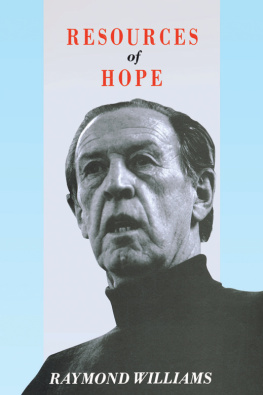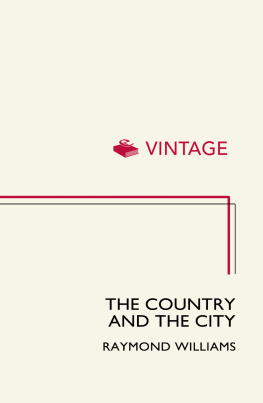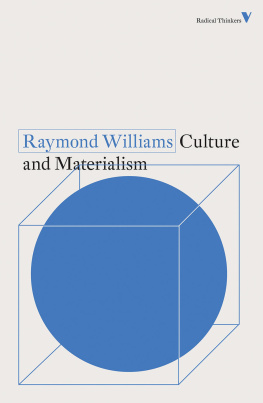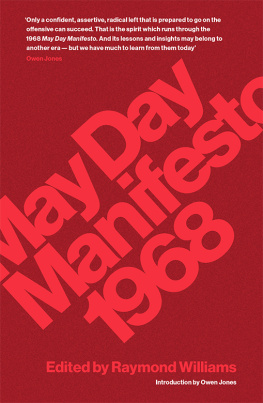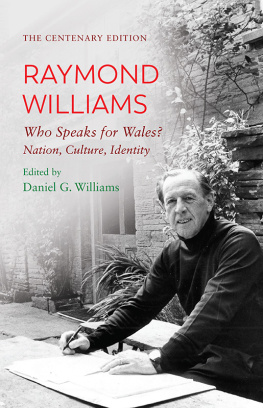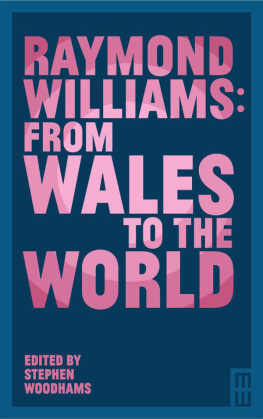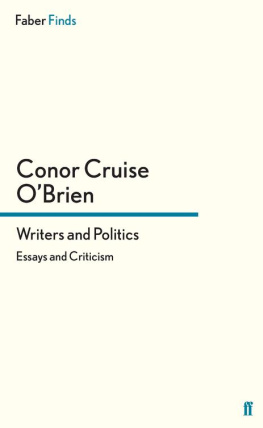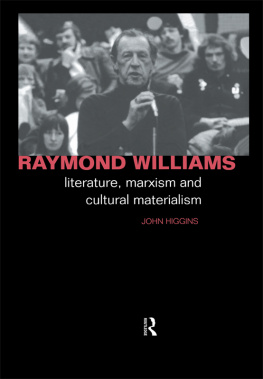Contents

Culture and Politics
Raymond Williams (19211988) was Professor of Drama at the University of Cambridge, where he worked from 1961 until his retirement in 1983. He previously taught for the University of Oxford Delegacy of Extra-Mural Studies and the Workers Educational Association in East Sussex. His books include Culture and Society (1958), Border Country (1960), The Long Revolution (1961), Modern Tragedy (1966), The Country and the City (1973), Keywords (1976), Marxism and Literature (1977), and Towards 2000 (1983).
Phil OBrien is the author of The Working Class and Twenty-First-Century British Fiction (2020). He is on the editorial board of Key Words: A Journal of Cultural Materialism, secretary of the Raymond Williams Society, and has taught at the University of Manchester, Liverpool John Moores University, Edge Hill University, and the Open University.
Culture and Politics
Class, Writing, Socialism
Raymond Williams
Edited with an Introduction by Phil OBrien

First published by Verso 2022
Raymond Williams 2022
Introduction Phil OBrien 2022
All rights reserved
The moral rights of the authors have been asserted
1 3 5 7 9 10 8 6 4 2
Verso
UK: 6 Meard Street, London W1F 0EG
US: 20 Jay Street, Suite 1010, Brooklyn, NY 11201
versobooks.com
Verso is the imprint of New Left Books
ISBN-13: 978-1-78873-863-7
ISBN-13: 978-1-78873-865-1 (HARDBACK)
ISBN-13: 978-1-78873-867-5 (US EBK)
ISBN-13: 978-1-78873-866-8 (UK EBK)
British Library Cataloguing in Publication Data
A catalogue record for this book is available from the British Library
Library of Congress Cataloging-in-Publication Data
A catalog record for this book is available from the Library of Congress
Typeset in Minion Pro by MJ & N Gavan, Truro, Cornwall
Printed in the UK by CPI Group (UK) Ltd, Croydon, CR0 4YY
Contents
Five of the ten essays included in this book have never been published before in their current form, while a sixth (British Working-Class Literature after 1945) was published for the first time in 2020 in Key Words: A Journal of Cultural Materialism. The essays were originally delivered as lectures, are held in the Raymond Williams archive, or have been published in edited collections and journals as follows: Herbert Read: Freud, Art, and Industry is an unpublished chapter from Culture and Society: 17801950 (1958), originally titled Sir Herbert Read and held in the Raymond Williams Collection in the Richard Burton Archives, Swansea University (WWE/2/1/6/4/10); The Future of Marxism was published in The Twentieth Century, 170.1010, July 1961, 12842, and later in New Left Review, 114, NovDec 2018, 5365; The Meanings of Work is from Work: Twenty Personal Accounts, ed. Ronald Fraser (Penguin with New Left Review, 1968), 28098; Marxist Cultural Theory is an edited transcript from an archive of recordings loaned by the Williams Estate it is a re-recorded version of a lecture originally given in Montreal in April 1973; Popular Culture: History and Theory is a talk delivered at the Open University on 23 May 1978 the transcription by Tony Bennett was published in Popular Culture No. 2 Bulletin, Open University, August 1978, and later in Cultural Studies, 32.6, November 2018, 90328; British Working-Class Literature after 1945 is an edited transcript of a lecture given at Aarhus University, Denmark, 25 September 1979 it was published in Key Words, 18, 2020, 4555; Pierre Bourdieu and the Sociology of Culture was co-authored by Nicholas Garnham and appeared in Media, Culture and Society, 2.3, July 1980, 20923; Popular Forms of Writing is an edited transcript of a talk given at Centerprise, Hackney, 8 January 1982; The Future of Socialism was delivered at Heathlands Hotel, Bournemouth on a New Socialist panel (titled The Future of Socialism) at the Labour Party Conference fringe, 30 September 1985 the transcript, titled Discussion between Raymond Williams and Tony Benn, is held in the Williams archive at Swansea (WWE/2/1/7/3/7); When Was Modernism? is an edited transcript of a Lewis Fry Memorial Lecture delivered on 17 March 1987 at the University of Bristol. All ten of the essays have been revised the previously published material, the archive papers and, particularly, the lecture transcriptions but only lightly and where appropriate, in order to enhance yet preserve Williamss original work.
Merryn Williams, the daughter of Raymond Williams, has supported this project from the beginning and, by kindly loaning a treasure trove of lecture recordings following a memorable afternoon in Oxford in Spring 2019, her involvement transformed the collection. Many thanks to Merryn, her husband John, and the Williams family. This book is for them. Thanks to John Merrick at Verso whose unstinting support from the outset has made this book possible and to Leo Hollis for overseeing its publication. Ben Harker and Daniel Hartley generously offered their expertise and guidance on the introduction; John Connor, Daniel Gerke, and Ted Striphas aided with the sourcing of material; and Daniela Caselli gave much-needed advice on Antonio Gramsci. Thanks to Nicholas Garnham and SAGE for allowing the inclusion of the Bourdieu essay, Tony Bennett for approving the use of his transcription of the Open University talk, Ken Worpole for sharing his memories of Williamss visit to Hackney, and to the Barry Amiel and Norman Melburn Trust who provided funding to transcribe the lecture tapes. The Working Class Movement Library in Salford helped track down crucial information on Tony Benn, as did the trustees of the Benn estate, and the archivists at Swansea University and the University of Reading offered their invaluable expertise and helped with the publication of archival material. Along with thanking Merryn and the estate of Raymond Williams, I also express my gratitude to the trustees of the estates of Stuart Hall, E. P. Thompson, Pierre Bourdieu, and Tony Benn who have approved the use of personal papers held amongst Williamss own papers in South Wales.
Introduction: Raymond Williams
on Culture and Politics
It is as if a fixed point in the landscape has suddenly dissolved, wrote a distraught E. P. Thompson on the death of Raymond Williams in January 1988. Crucially, the timely selection and publication in Williamss centenary year of what have been difficult to find essays and previously unavailable lectures is an attempt to draw out the opportunities contained in his writing for radical transformations in culture and society in the twenty-first century.
It is with his landmark book of that name Culture and Society (1958) that the collection begins, in the form of a lost chapter on the critic and anarchist Herbert Read, unpublished and archived until now.
It was the conclusion to Culture and Society which also attracted the strongest condemnation from reviewers on its publication while signalling the way forward for the direction of Williamss thinking with its radical insights into class, democratization, and the importance of popular culture. Review after review from 1958 comment on the controversial content of the final pages, suggesting, in contrast to Day-Lewis, that it did at least contain original thinking. The most histrionic response came from that organ of liberal thought in Britain,


